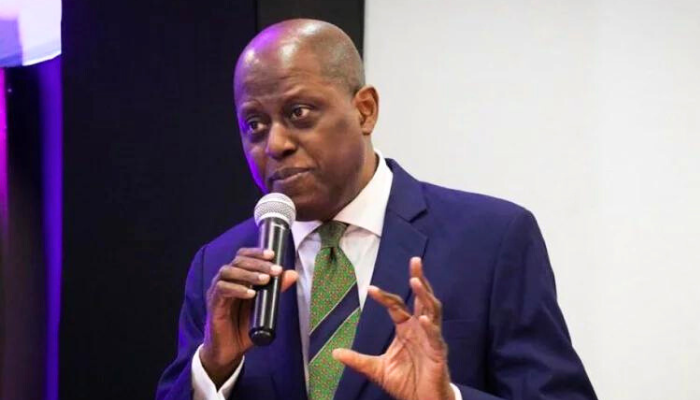The new management team at the Central Bank of Nigeria faces a herculean task that demands an articulate and professional approach, to first understand the depth of challenge it’s up against. The governor, Dr. Olayemi Cardoso, and his four deputies must first reinvent the CBN, this strategic institution that has over the years lost the ability to perform its statutory role of stabilising the nation’s economy and priming it for growth.
So, while we at Daily Trust congratulate the governor and his lieutenants on their appointment, the team must understand that it has to hit the ground running. It must chart a course of action to tackle the macroeconomic disequilibrium, marked by rising inflation, unemployment, high poverty rate, falling currency value, declining investment inflow, low foreign exchange earnings and reserves, a general economic dislocation, and rising social discontent.
The team must design an anti-inflation toolkit to tackle the scourge that is fast eroding Nigerians’ faith in the nation’s currency. There is an urgent need for the monetary authorities to rein in the inflationary spiral that has eroded the welfare of millions of Nigerians. Right now, many Nigerians can no longer afford the basic things of life, as rising prices have pushed these beyond their reach.
Headline inflation has risen from 21.34 per cent at the end of December last year to the current level of 25.8%, the highest in 18 years (since August 2005).
Food inflation is even worse. It currently stands at 29.34%, up from 23.75% in December last year. At this level, ordinary Nigerians now have to spend a lot more money to be able to afford the same basket of foods they enjoyed at the beginning of the year. In a situation where incomes are shrinking and all prices are soaring, this means more nightmares for millions of Nigerian households.
The new team at the helm of affairs at the CBN must also take proactive measures to strengthen the naira to arrest its continuous slide in value. This erosion of the value of the local currency is obviously contributing to the escalation in the inflation rate as it puts further pressure on the purchasing power of the naira.
One of the ways by which this can be done is to improve the nation’s foreign exchange reserves. While we acknowledge that this is a long-term objective, we believe that immediate steps must be initiated to reverse the decline in the inflow of foreign earnings.
So, Governor Cardoso and his senior team must aim to arrest the decline of the foreign reserves, which have fallen by about 9.76% from $36.05b (liquid component) at the beginning of the year, to its value of $32.53b as of September 26, this year. With the continuing decline of the nation’s reserves, the power of the CBN to meet the demand for the naira is getting weaker. This is evident from the steep decline in the value of the local currency at both the official window (the I&E window) and the parallel market, where the naira has reached the landmark rate of N1000/$ rate.
There should be robust consultations with all those whose activities impact and are in turn impacted by the policies of the regulator. There must be quality debates on the fundamental issues of foreign exchange policies and credible measures to stimulate the real sector of the economy. This is needed to spur domestic production and export of non-oil products, the dearth of which is at the heart of the current macroeconomic distortions. Above all, the independence of the CBN remains sacrosanct and must be defended at all times. The conduct of purposeful monetary policies remains the exclusive preserve of the central bank leadership. It, therefore, demands that the institution be insulated at all times from the influence of the political class.
Those who have been appointed to lead this very important institution must show that they possess the requisite capacities and truly deserve the positions they now occupy. They do this by remaining resolute and committed to basic economic principles as critical determinants of all policies. Policies must be considered from the point of view of what is best for the generality of the Nigerian consumers in whose interest all monetary policies are to be conducted.
Without a doubt, the independence of the central bank will ensure that it performs its regulatory roles effectively. Doing this entails bringing all operators in the financial services sector under the firm control of the CBN. In this regard, the bank must take a second look at the roles that Bureaux de Change plays in the foreign exchange market.
Finally, with the Monetary Policy Rate already at 18.75%, the central bank may also consider slowing down on its tightening policy stance from the next meeting of its Monetary Policy Committee. This hawkish measure has seen the interest rate climb to this level from 16.5% at the beginning of the year, as the bank embarked on an aggressive fight against rising inflation.
Adopting a softening posture on its interest rate policy will at least reduce the pressure on the general price level. Besides, given that this tightening stance has failed so far to halt the inflationary spiral, it suggests that other measures are needed now. We wish the leadership the best in the new assignment.

 Join Daily Trust WhatsApp Community For Quick Access To News and Happenings Around You.
Join Daily Trust WhatsApp Community For Quick Access To News and Happenings Around You.


